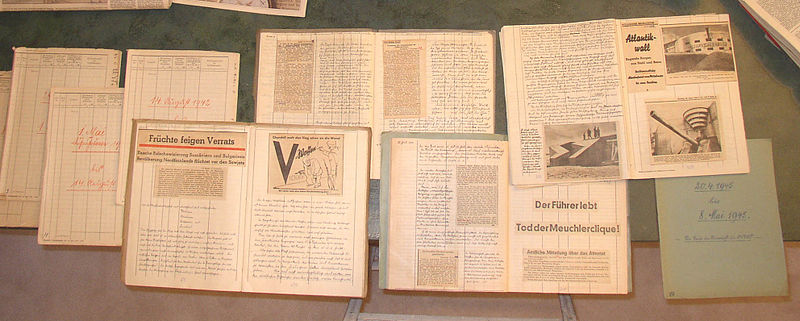319-Friedrich Kellner's Opposition
Futility Closet
Greg Ross
4.8 • 748 Ratings
🗓️ 16 November 2020
⏱️ 34 minutes
🧾️ Download transcript
Summary

In the 1930s, German civil servant Friedrich Kellner was outraged by the increasing brutality of the Nazi party and the complicity of his fellow citizens. He began to keep a secret diary to record the crimes of the Third Reich and his condemnations of his countrymen. In this week's episode of the Futility Closet podcast, we'll tell the story of Friedrich's diary and his outspoken warnings to future generations.
We'll also ponder the problem with tardigrades and puzzle over a seemingly foolish choice.
Intro:
In 1983, Kenneth Gardner patented a way to cremate corpses using solar energy.
How can Anna Karenina's fate move us when we know she’s not a real person?
Sources for our feature on Friedrich Kellner:
Robert Scott Kellner, ed., My Opposition: The Diary of Friedrich Kellner -- A German Against the Third Reich, 2018.
Hermann Beck, "My Opposition: The Diary of Friedrich Kellner -- A German Against the Third Reich," Holocaust and Genocide Studies 33:2 (Fall 2019), 271-273.
Peter Fritzsche, "Vernebelt, verdunkelt sind alle Hirne." Tagebücher 1939-1, Central European History 45:4 (December 2012), 780-782.
David Clay Large, "My Opposition: The Diary of Friedrich Kellner; A German Against the Third Reich," Journal of Modern History 91:2 (June 2019), 480-481.
Robert Scott Kellner, "Nebraskan, Other U.S. Soldiers Brought Justice to WWII German Town," Omaha World-Herald, May 8, 2020.
Robert Scott Kellner, "Commentary: He Documented Nazi Crimes, Secretly, for the Future to Know," Chicago Tribune, April 18, 2020.
Robert Scott Kellner, "'The American Army Makes an Impression,'" Wall Street Journal, March 27, 2020.
Robert Scott Kellner, "Waiting for D-Day in Germany," Los Angeles Times, June 6, 2019, A.11.
Robert Scott Kellner, "The Curse of an Evil Deed," [Washington, D.C.] Examiner, May 8, 2019.
Matt Lebovic, "New Memoir Compilation by Hitler's Personal Staff Airs Historical Dirty Laundry," Times of Israel, Oct. 13, 2018.
Jane Warren, "Exposed: Myth That Civilians Knew Nothing of Nazi Atrocities," Daily Express, March 10, 2018, 31.
Laurence Rees, "Meet Friedrich Kellner: The Unlikely Face of Nazi Resistance," Telegraph, Jan. 22, 2018.
Richard J. Evans, "My Opposition: The Diary of Friedrich Kellner Review – A German Against the Nazis," Guardian, Jan. 12, 2018, 6.
Matt Lebovic, "What Did Germans Know? Secret Anti-Nazi Diary Gives Voice to Man on the Street," Times of Israel, Jan. 8, 2018.
Benjamin Weinthal, "A Diary for the Future," Jerusalem Post, Jan. 27, 2012, 12.
"Germany Weaves Web of Its Modern History," [Abu Dhabi] National, Nov. 1, 2011.
"A Reminder of the Need to Preserve the Truth," [Montreal] Gazette, Oct. 17, 2011, A.23.
Madeline Chambers, "'Ordinary' German's Diary Decried Nazi Atrocities," [Montreal] Gazette, Oct. 13, 2011, A.18.
Graeme Morton, "Diaries Chronicle Fall Into Hitlerian Hell," [Victoria, B.C.] Times Colonist, Nov. 17, 2007, C4.
Sam Ser, "Anti-Nazi's Revealing Wartime Diaries Become 'Weapon to Combat Evil,'" Jerusalem Post, April 5, 2005, 6.
Phil Magers, "Feature: German's War Diary Goes Public," UPI Perspectives, March 25, 2005.
Robert Scott Kellner, "Opposing the Nazis: The Secret Diary of a German Against the Third Reich," History Extra, Aug. 22, 2018.
Robert Scott Kellner, "Where Will the Culture of Internet Attacks Lead? Nazi Opponent Friedrich Kellner's Diaries Offer Warnings," History News Network, Aug. 23, 2020.

Listener mail:
Poppy Noor, "Overzealous Profanity Filter Bans Paleontologists From Talking About Bones," Guardian, Oct. 16, 2020.
Maria Cramer, "Paleontologists See Stars as Software Bleeps Scientific Terms," New York Times, Oct. 18, 2020.
Becky Ferreira, "A Profanity Filter Banned the Word 'Bone' at a Paleontology Conference," Vice, Oct. 15, 2020.
Thomas R. Holtz Jr., "SVPers: I have put together a sheet of the 'banned' words on the Q&A function at #2020SVP so far," Twitter, Oct. 13, 2020.
Samantha Cole, "PayPal Is Stalling Cute Tardigrade Merch -- and a Notorious Weapons Dealer Is to Blame," Vice, Sept. 11, 2020.
Tim Ellis, "Weird Seattle Retailer Archie Mcphee Hit With Even Weirder Paypal Problem, Foiling Tardigrade Sales," GeekWire, Sept. 11, 2020.
"Rubber Chicken Museum," Atlas Obscura, accessed Nov. 1, 2020.
"Archie McPhee's Rubber Chicken Museum," Archie McPhee, accessed Nov. 1, 2020.
This week's lateral thinking puzzle was contributed by listener Scarlett Casey.
You can listen using the player above, download this episode directly, or subscribe on Google Podcasts, on Apple Podcasts, or via the RSS feed at https://futilitycloset.libsyn.com/rss.
Please consider becoming a patron of Futility Closet -- you can choose the amount you want to pledge, and we've set up some rewards to help thank you for your support. You can also make a one-time donation on the Support Us page of the Futility Closet website.
Many thanks to Doug Ross for the music in this episode.
If you have any questions or comments you can reach us at [email protected]. Thanks for listening!
Transcript
Click on a timestamp to play from that location
| 0:00.0 | Welcome to the Futility Closet Podcast, forgotten stories from the pages of history. |
| 0:15.0 | Visit us online to sample more than 11,000 quirky curiosities from solar cremation to the paradox of fiction. This is episode |
| 0:23.1 | 319. I'm Greg Ross. And I'm Sharon Ross. In the 1930s, German civil servant Friedrich Kellner |
| 0:30.3 | was outraged by the increasing brutality of the Nazi party and the complicity of his fellow citizens. |
| 0:36.4 | He began to keep a secret diary to record the crimes of the Third Reich and his complicity of his fellow citizens. He began to keep a secret diary to record the |
| 0:38.8 | crimes of the Third Reich and his condemnations of his countrymen. In today's show, we'll tell |
| 0:44.0 | the story of Friedrich's diary and his outspoken warnings to future generations. We'll also |
| 0:49.8 | ponder the problem with tardigrades and puzzle over a seemingly foolish choice. |
| 1:01.0 | In 1960, a 19-year-old American naval petty officer named Robert Scott Kellner found himself |
| 1:08.0 | on a layover at Frankfurt Air Force Base in Germany. His father had died |
| 1:12.4 | recently, and he had never met his father's parents, who he knew lived in a German town |
| 1:16.5 | called Laubach. After some searching, he found them there, a tall, 75-year-old man named Friedrich |
| 1:22.2 | and his wife, Paulina. On the first evening, Friedrich showed Robert a series of notebooks, almost 900 pages, filled with |
| 1:29.5 | newspaper clippings and cryptic old German script. Friedrich explained that this was a diary |
| 1:34.5 | he had written during World War II to document Hitler's rise to power and the crimes of the Nazi regime. |
| 1:40.5 | He devoted six years to the project, filling ten notebooks with news reports and his own outrage and dismay. |
| 1:46.9 | If he'd been discovered, he would have been executed as a traitor. |
| 1:50.2 | He told Robert, I could not fight the Nazis in the present as they had the power to still my voice. |
| 1:55.0 | So I decided to fight them in the future. |
| 1:57.2 | I would give the coming generations a weapon against any resurgence of such evil. |
| 2:01.6 | My eyewitness account would record the barbarous acts and also show the way to stop them. |
| 2:06.7 | He pointed to the title, where Hitler's manifesto had been called Mankf, or My Struggle, |
... |
Please login to see the full transcript.
Disclaimer: The podcast and artwork embedded on this page are from Greg Ross, and are the property of its owner and not affiliated with or endorsed by Tapesearch.
Generated transcripts are the property of Greg Ross and are distributed freely under the Fair Use doctrine. Transcripts generated by Tapesearch are not guaranteed to be accurate.
Copyright © Tapesearch 2025.

